In 2024, choosing the right marketing platform is critical if you’re looking to stand out online. With technology and user habits shifting rapidly, the platform you select plays a pivotal role in connecting with your audience and driving success.
This guide will walk you through the top 6 marketing platforms of the year, offering advice on picking the one that will best amplify your marketing efforts and propel your business forward in today’s digital marketplace.
The Rise of Marketing Platforms
Marketing platforms have transformed dramatically, from traditional billboards and print ads to digital spaces where creativity meets analytics. This evolution has been fueled by relentless technological advancements, reshaping how businesses connect with their audience.
- Early Days: Initially, marketing was one-way communication through print and broadcast media.
- Digital Revolution: The internet era introduced websites and email, marking the beginning of digital marketing.
- Social Media Surge: Platforms like Facebook and Twitter added a new layer, enabling two-way conversations and targeted advertising.
- AI and Automation: Recent years have seen artificial intelligence and automation refine targeting, personalization, and efficiency.
These shifts have made marketing strategies more data-driven and personalized, significantly enhancing the ability to reach and engage the intended audience effectively.
Top 6 Marketing Platforms of 2024
As we march into 2024, the digital marketing sphere continues to evolve, presenting a variety of marketing platforms each vying for the top spot. Below, we explore the top 6 marketing platforms of the year, chosen for their innovative features, versatility, and ability to cater to businesses of all sizes. From AI-driven analytics to comprehensive automation capabilities, these platforms are at the forefront of shaping effective marketing strategies in the digital age.
HubSpot Marketing Hub
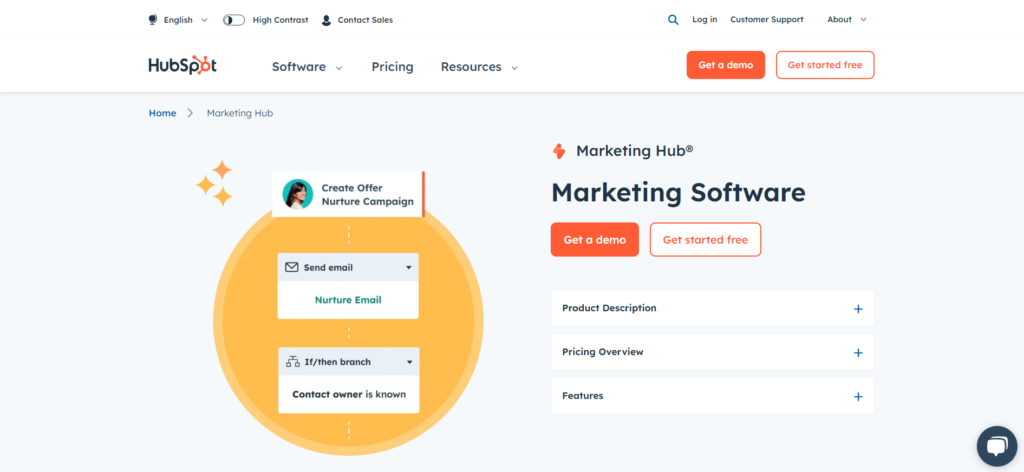
HubSpot Marketing Hub is a leader in the digital marketing world, offering a robust suite of tools designed to attract, engage, and delight customers at every stage of their journey. It’s a comprehensive platform that merges content creation, marketing automation, and analytics into one intuitive interface.
Key Features:
- Automated marketing workflows
- SEO and content strategy tools
- Social media management
- Lead management and analytics
- Email marketing
Benefits:
- Streamlines various marketing activities into one platform
- Enhances inbound marketing strategies
- Provides detailed analytics to measure campaign effectiveness
- Simplifies lead generation and management
Drawbacks:
- Can be overwhelming for beginners due to its extensive features
- Higher-tier plans can be costly for small businesses
Suited For:
Businesses of all sizes looking to implement a comprehensive inbound marketing strategy, from startups to large enterprises.
Our Thoughts:
HubSpot Marketing Hub excels in its ability to provide a 360-degree view of marketing efforts, enabling businesses to craft data-driven strategies that resonate with their audience. Its scalability and depth make it an invaluable asset for marketers aiming to elevate their digital presence.
Mailchimp Marketing Platform
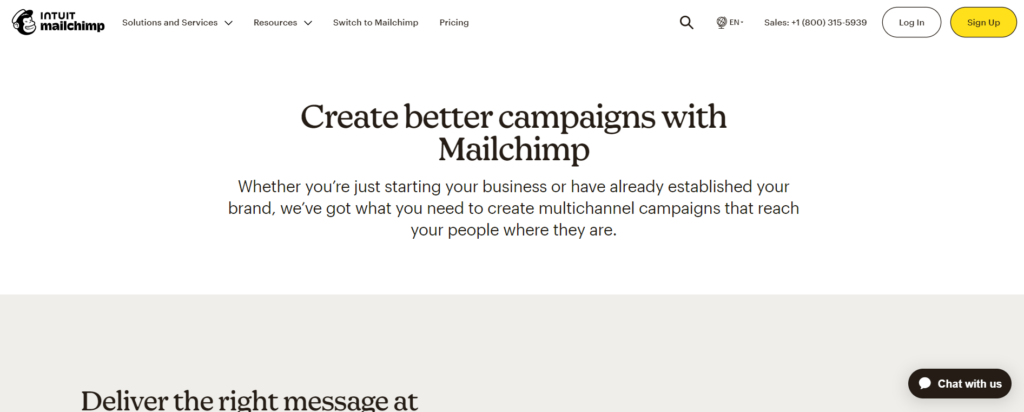
Mailchimp has evolved from an email marketing tool into a full-fledged marketing platform designed to help small businesses grow. It offers an all-in-one solution for digital marketing needs, emphasizing ease of use, automation, and integration capabilities.
Key Features:
- Email marketing campaigns
- Automation and personalization
- Landing pages and digital ads
- Audience segmentation and analytics
- CRM tools
Benefits:
- User-friendly interface ideal for beginners
- Comprehensive integration options with apps and services
- Free tier available for small startups
- Strong focus on email marketing with advanced features
Drawbacks:
- Limited customization options for advanced users in certain areas
- As businesses scale, they may outgrow the platform’s capabilities
- Higher-tier plans can become expensive
Suited For:
Startups and small to medium-sized businesses seeking an accessible platform to kickstart their marketing efforts, particularly those focused on email marketing.
Our Thoughts:
Mailchimp’s transition into a broader marketing platform offers a range of tools that cater to the digital marketing needs of smaller businesses. Its strength lies in its simplicity, making it an excellent choice for those new to digital marketing or with limited resources.
Salesforce Marketing Cloud
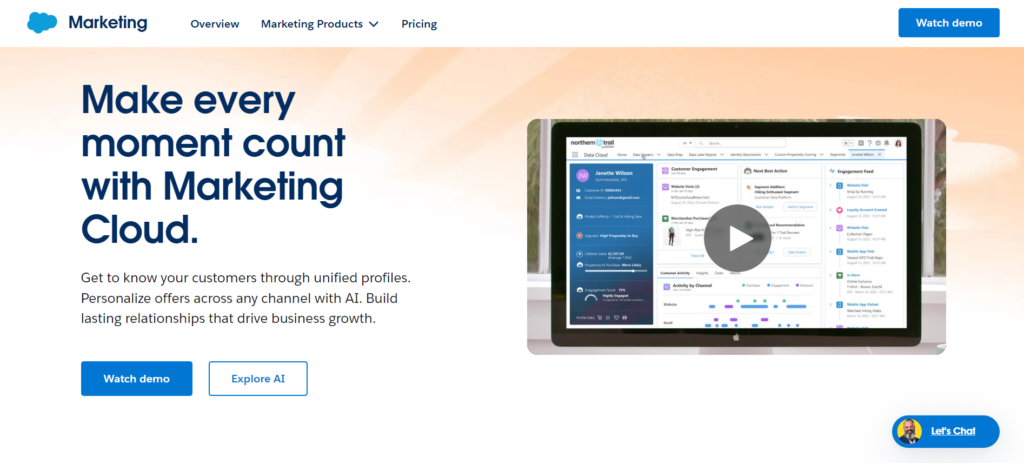
Salesforce Marketing Cloud provides a powerful, data-driven platform designed to create personalized customer journeys across multiple channels. By leveraging the power of AI and cloud technology, it offers businesses the tools to connect with customers on a new level.
Key Features:
- Customer journey management
- Email, mobile, and social media marketing
- AI-powered insights and analytics
- Audience segmentation
- Cross-channel personalization
Benefits:
- Enables highly personalized customer experiences
- Integrates seamlessly with Salesforce CRM for deeper customer insights
- Offers comprehensive analytics to track and optimize campaigns
- Supports large-scale marketing efforts across various channels
Drawbacks:
- Can be complex to set up and use, requiring a steep learning curve
- Higher cost compared to some other platforms, making it less accessible for small businesses
- May require additional resources or training to fully leverage all features
Suited For:
Medium to large businesses and enterprises that require advanced marketing automation tools and have the resources to invest in a comprehensive platform.
Our Thoughts:
Salesforce Marketing Cloud stands out for its ability to orchestrate personalized customer journeys at scale. While it presents a more complex and costly solution, the return on investment for businesses with the means to fully utilize its capabilities can be significant, making it a powerhouse in customer relationship management and marketing automation.
Adobe Experience Cloud
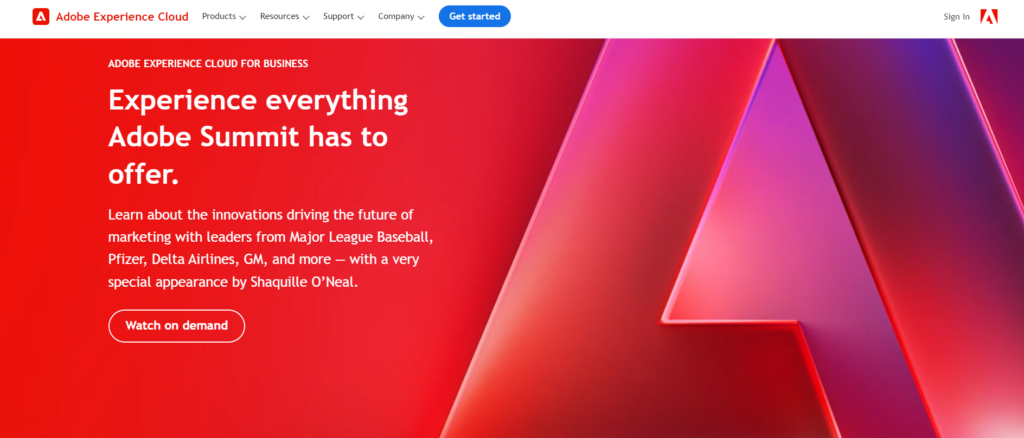
Adobe Experience Cloud represents a comprehensive suite of marketing, analytics, advertising, and commerce tools designed to offer deep insights into customer behavior and tailor experiences across every touchpoint. As part of Adobe’s digital experience solutions, it integrates seamlessly across Adobe’s product lineup, offering businesses powerful capabilities to deliver personalized customer journeys.
Key Features:
- Cross-channel marketing automation
- Real-time analytics and audience profiling
- Personalization at scale
- Content management and optimization
- Digital asset management
Benefits:
- Unified platform for all marketing needs
- Advanced analytics for deeper customer insights
- Highly customizable customer experiences
- Seamless integration with Adobe Creative Cloud
Drawbacks:
- May require significant investment, making it less accessible for smaller businesses
- Complex tools that come with a learning curve
Suited For:
Large enterprises and businesses looking for an all-encompassing platform to manage extensive digital marketing operations and who already rely on Adobe’s ecosystem of products.
Our Thoughts:
Adobe Experience Cloud offers unmatched depth in analytics and personalization capabilities, making it a powerful ally for businesses aiming to refine their digital experience strategies. While it demands a considerable investment in time and resources, the potential for transforming customer interactions into meaningful relationships makes it a compelling choice for large-scale enterprises.
Semrush
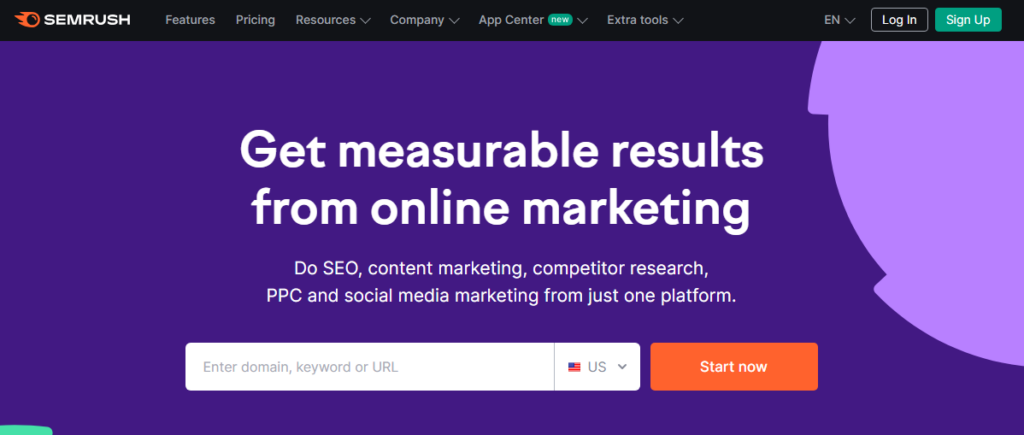
Semrush is a versatile and powerful digital marketing platform known for its comprehensive suite of SEO, content, social media, and market research tools. It assists businesses in enhancing their online visibility and conducting in-depth competitor analysis to inform strategic decisions.
Key Features:
- SEO audit and keyword research
- Competitor analysis
- Content marketing toolkit
- Social media management
- Paid advertising tools
Benefits:
- Offers an all-in-one platform for various digital marketing needs
- Provides detailed insights into competitors’ strategies
- Facilitates content optimization for better SEO performance
- Streamlines social media scheduling and analytics
Drawbacks:
- Can be costly for small businesses or individual marketers
- Features can be overwhelming for beginners
Suited For:
Marketing professionals, SEO specialists, and businesses of all sizes looking to improve their online presence and execute competitive digital marketing strategies.
Our Thoughts:
Semrush stands out for its robust analytical tools and versatility, catering to a broad spectrum of digital marketing needs. While it presents a learning curve and requires investment, the depth of insights and the comprehensive nature of the platform make it a valuable asset for serious marketers aiming for growth and competitive advantage.
Omnisend
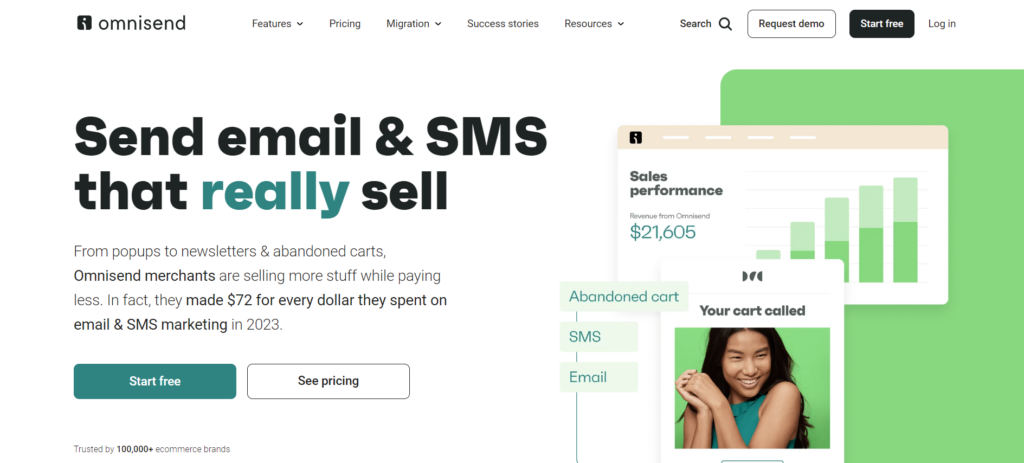
Omnisend is an email marketing platform tailored for ecommerce businesses, focusing on automating email and SMS marketing to enhance customer retention and increase sales. With its user-friendly interface, Omnisend allows marketers to create highly personalized and targeted marketing campaigns with ease.
Key Features:
- Automated email and SMS marketing workflows
- Segmentation of customers based on shopping behavior and preferences
- Customizable email templates and forms
- Integration with ecommerce platforms
- Detailed performance analytics
Benefits:
- Streamlines communication with customers across multiple channels
- Enhances personalization, improving customer engagement and loyalty
- Simplifies the creation and management of marketing campaigns
- Provides actionable insights to optimize marketing strategies
Drawbacks:
- Primarily focused on email and SMS, which may require additional tools for a full marketing strategy
- Some advanced features may require a higher-tier plan
Suited For:
Ecommerce businesses of all sizes looking to leverage email and SMS marketing to drive sales and build customer relationships.
Our Thoughts:
Omnisend offers a specialized solution for ecommerce marketing, making it an excellent choice for businesses aiming to connect with their audience through personalized, automated messaging. While it may not cover every marketing need, its focus on email and SMS makes it a powerful tool in any ecommerce marketer’s arsenal.
Empower Your Marketing Strategy with Flying V Group’s Expertise
Selecting the right marketing platform is crucial in today’s digital landscape, yet the abundance of options can be overwhelming, especially for small to medium-sized businesses aiming to leverage these tools effectively. Mastery of these platforms is key to unlocking their full potential and driving significant growth. This is where Flying V Group comes into play.
As an award-winning, growth-focused full-service digital marketing agency, we specialize in navigating the complex world of marketing platforms. Using the top marketing platforms to glean powerful insights, we create laser-targeted marketing strategies and deploy them in the right manner so that your business reaps the rewards of tangible growth.
Let Flying V Group be your guide and partner in harnessing the power of marketing platforms to achieve unparalleled success.
FAQs
What is the best platform for marketing?
The best platform for marketing depends on your target audience and goals. HubSpot, Salesforce, and Semrush are top choices for their comprehensive tools and analytics capabilities.
What is a marketing platform?
A marketing platform is a suite of tools designed to help businesses automate, analyze, and improve their marketing efforts across various channels like email, social media, and web content.
What are the digital marketing platforms?
Digital marketing platforms include social media sites (Facebook, Instagram), search engines (Google AdWords), email marketing tools (Mailchimp, Omnisend), and analytics services (Google Analytics).
Which platform is best for advertising?
Google AdWords and Facebook Ads are among the best platforms for advertising due to their vast reach and advanced targeting options, catering to a wide range of business types and objectives.
Is a website a marketing platform?
Yes, a website is a foundational marketing platform. It serves as the central hub for a brand’s online presence, where information is shared, products are displayed, and contact with customers is made.






0 Comments